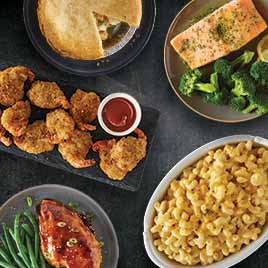Digestive HealthMany believe that overall health is dictated by our digestive system, and yet, so many of us are plagued by irregularity, IBS, bloating and other digestive woes. Maintaining good digestive health can be simple – just a few small changes to your diet can yield big results, such as helping you maintain regularity while also helping you flatten your belly, increase your energy, and keep your immune system strong. One simple way to find a diet that will provide better digestive health is by following the Guiding Stars®. The Guiding Stars system at Hannaford is an in-store resource that can help you quickly find nutritious foods as you shop. While Guiding Stars is not a special diet and does not address all digestive wellness nutrition concerns specifically, it’s a great place to start when you’re shopping for foods that support a healthy diet. Guiding Stars can help you narrow your choices as you shop by highlighting items that contain more beneficial attributes, like fiber (which is key to good digestive health), calcium, and vitamins, and fewer elements that experts tell us we should limit, like sodium, saturated fats and added sugar. Best Bets for Nutritious Choices >> You’ll improve your digestive health when you eat more of these foods:High-Fiber FoodsMost of us only get about half the recommended levels of fiber per day. How can we improve this? Adding whole grains into breakfast is one efficient way, and it’s easy to accomplish. Try having a whole-grain cereal each morning. The Kashi line of high-fiber breakfast cereals, such as Good Friends and GoLean are great choices. Both offer high fiber in a delicious package. Also, try Kellogg’s All-Bran cereal, which delivers up to 40% of your recommended daily allowance in only 70 small calories. Another easy, inexpensive way to add fiber is to eat legumes. They are very high in fiber but still low in calories. Add chickpeas to your salad or enjoy a cup of vegetarian chili. If you eat white bread, switch to whole wheat. Specifically, look for those with at least 3 grams of fiber in each slice. This is important because highly processed foods (like white bread) are less effective in helping your body eliminate waste. FlaxseedWhat makes flaxseed stand out above other whole grains is its mix of fiber. Rather than containing large amounts of one type of fiber, flaxseed contains generous quantities of both soluble and insoluble fiber. Researchers are particularly interested in the cancer-fighting ability of lignans. Flaxseed is one of the richest sources of lignans in the plant kingdom. Flaxseed is also chock full of nutrients! It contains omega-3 fatty acids, which help protect against heart disease, stroke and cancer. Flaxseed’s soluble fats help lower cholesterol and triglycerides and can also help stabilize blood sugar. Ground flaxseed has a great nutty taste, is inexpensive, and it offers huge health benefits. You may have seen it and wondered what it was, or you may never have heard of it before, but if you want to be as healthy as you can be, you should give it a try. Found in your nearby Hannaford’s Nature’s Place section, this food is a nutrition powerhouse. ProbioticsProbiotics can be found in many foods today. They are friendly bacteria that are found naturally in the digestive track. Although more research does need to be done, there is evidence that some strains of probiotics can help boost the immune system. When we are healthy, more than a trillion microorganisms exist and help to crowd out harmful bacteria. As we get older, good bacteria naturally declines, so we need to add it back through our diets. An easy, tasty way to do this is by eating yogurt. Today, there are many different kinds of yogurt on the market that can help with regularity. Try Dannon Activia products with the probiotic strain, Bifidus Regularis, sold at Hannaford. Yogurts also supply you with calcium, riboflavin, vitamin B12, vitamin D and potassium, which are all critical for good health. |

main menu
-
Shop
-
Departments
- Produce
- Bakery
- Deli
- Meal Solutions
- Meat
- Seafood
-
Grocery
Grocery
- View All
- Applesauce & Fruit
- Baking Needs
- Breakfast & Cereal
- Candy
- Canned Meat & Seafood
- Canned Vegetables
- Condiments & Dressing
- Convenience Meals
- Cookies
- Greeting Cards
- International
- Packaged Bread, Muffins & Pastries
- Pasta, Sauces & Sides
- Peanut Butter, Jelly & Honey
- Rice, Beans & Potatoes
- Sauces, Spices & Seasonings
- Snacks, Chips, Crackers & Nuts
- Soups
- Dairy
- Frozen
- Beverages
- Baby
- Pet
- Home Needs
- Health & Beauty Care
- View All
- Hannaford to go
- Gift Cards
- Special Occasion Orders
Other Ways to Shop -
Departments
-
Save
-
Get Inspired
Featured Recipes
Meredith Hannaford
Meredith Hannaford(03253)
We've pre-selected this store to help you explore our products and services. If this isn't your store, select a new store to see the prices and products in your area.
Select a New Storeloading







